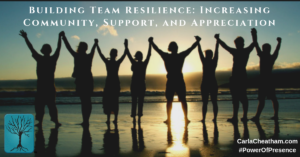Building Team Resilience: Increasing Support, Community & Appreciation (a 3 1/2 minute read)
Leadership experts these days agree that employees are our most important customers, and I believe this to be true.
One of my favorite, and one of the most effective, hospice administrators I’ve known often says, “If we take good care of employees, they’ll take good care of patients and families. If we do that, the money will come.” She was so very right, and our profit margins proved it.
Resilience literature also tells us that feeling connected increases our ability to not only survive but to actually thrive through challenging times.
Given the uncertainty many healthcare organizations are facing these days, we can’t afford to NOT invest time and energy into creating a culture of support, camaraderie, and cohesion, and community amongst our teams.
One practical way we can do this is to identify what is meaningful to team members; how do they feel most appreciated, cared for, and supported? An easy way to begin this conversation is to ask employees to take a simple on-line quiz.
Many are familiar with the popular book, The 5 Love Languages by Gary Chapman. Before rolling eyes and writing this off as too fuzzy woo woo, managers and leaders would do well to at least consider this option.
The 5 Languages, or things that communicate to someone they are cared for, include:
- Gifts
- Words of affirmation
- Quality time
- Acts of service
- Touch
You can take the quiz on the love languages website by clicking on the “Learn Your Love Language” tab. The site will ask whether you are taking this for yourself or your child, then whether you are in a relationship or single. It will direct you to the correct version of the test for you to take on-line or to download as a PDF and take and score on your own.
I encourage leaders to identify their own and ask their teams to do so, as well. Take a few moments at your next meeting to discuss this as an agenda item. What were everyone’s results? What surprised them about their scores? What surprised them about others’ results?
Typically, one or two styles will stand out as most important and others will score as less so. The way we most like to receive care will often be the way we express it. That’s fine, if others share our preferences but, if not, a major disconnect can occur.
Buying coffee shop gift cards for employees to whom gifts mean little, but for whom words of affirmation mean the world, misses the mark. For the latter, taking a few extra moments to tell the person how much something they did or how they handled themselves in a situation means to you and thanking them for it may mean so much more.
A literal pat on the back, handshake, or hug (depending on your team culture) may mean far more to someone for whom touch communicates connection than will ordering lunch for the team to share before a meeting (quality time).
Since we tend to express care in the language that is most appreciated by and natural to us, many persons unintentionally botch attempts at extending care because they are speaking in the language that means something to them, rather than the intended recipient. Knowing this can a) help us potentially identify someone’s preferred caring style if we do not have their scores and b) help us see others’ attempts to express care to us in ways we might ordinarily miss.
The simple act of asking team members what helps them feel appreciated can mean the world to some teams. Following through on finding creative ways to match your support with their preferred language can mean even more.
When you ask, be prepared to hear about higher compensation and benefits, but remind them we’re speaking of the so-called intangibles of day to day interactions; the things leaders are more likely to be able to control without top leadership approval.
Certainly, advocate strongly for fair compensation, since a sense of fairness can also prevent dissatisfaction, burnout, and turnover, but we cannot forget the seemingly simple but incredibly important compensation we receive when we feel appreciated and valued in ways that extend beyond the paycheck.
Another intangible benefit workplaces can provide team members is the sense that their work is helping them to be better in other areas of their lives. For instance, in starting the conversation amongst your team members about their Love Languages, persons will not be able to help but immediately consider their significant others, children, and other family and friends and what their love languages may be.
One nurse said, “So when my husband mows the yard and expects me to be all impressed, it may be that his love language is acts of service and he assumes his doing that will mean something to me. It’s meant as an act of love, but I miss it because it’s not my language…OHHHHHhhhhhhh!!!!”
Often, they begin to try to figure out, or they even take the time to ask, what is most important to their kids or co-workers. As light bulbs go off and understanding increases, persons can feel more connected, in their personal and work families; they can ask for what is more likely to speak their language and find ways to give that to others, as well.
Imagine the conversations that can take place as we intentionally consider others’ love
languages and a attempt to match our efforts with their preferred styles. Secret holiday gift-giving in the office will never be the same!
Hopefully, the impact will be seen in employees having an increased sense of truly feeling valued, appreciated, and cared for at work.
For what it’s worth.
Carla
 Rev. Carla Cheatham, MA, MDiv, PhD, TRT has served hospices as a chaplain and bereavement coordinator. She’s the Section Leader for the Spiritual Caregivers Section of the National Hospice and Palliative Care Organization and an adjunct professor at the Seminary of the Southwest and an Affiliate Associate Professor at the University of Maryland. Through her Carla Cheatham Consulting Group, Carla provides training and consulting for professional caregivers nationwide. She is the author of Hospice Whispers: Stories of Life and its companion volume, Sharing Our Stories: A Hospice Whispers Grief Support Workbook. Her next book, On Showing Up with Suffering: Others’ and Our Own, is set to publish in 2017.
Rev. Carla Cheatham, MA, MDiv, PhD, TRT has served hospices as a chaplain and bereavement coordinator. She’s the Section Leader for the Spiritual Caregivers Section of the National Hospice and Palliative Care Organization and an adjunct professor at the Seminary of the Southwest and an Affiliate Associate Professor at the University of Maryland. Through her Carla Cheatham Consulting Group, Carla provides training and consulting for professional caregivers nationwide. She is the author of Hospice Whispers: Stories of Life and its companion volume, Sharing Our Stories: A Hospice Whispers Grief Support Workbook. Her next book, On Showing Up with Suffering: Others’ and Our Own, is set to publish in 2017.


